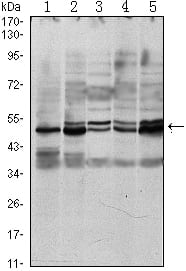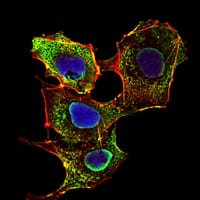

| WB | 1/500 - 1/2000 | Human,Mouse,Rat |
| IF | 咨询技术 | Human,Mouse,Rat |
| IHC | 咨询技术 | Human,Mouse,Rat |
| ICC | 1/200 - 1/1000 | Human,Mouse,Rat |
| FCM | 咨询技术 | Human,Mouse,Rat |
| Elisa | 1/10000 | Human,Mouse,Rat |
| Aliases | MADH3; JV15-2; HSPC193; HsT17436; MGC60396; DKFZp586N0721; DKFZp686J10186; SMAD3 |
| Entrez GeneID | 4088 |
| clone | 5G11 |
| WB Predicted band size | 48kDa |
| Host/Isotype | Mouse IgG1 |
| Antibody Type | Primary antibody |
| Storage | Store at 4°C short term. Aliquot and store at -20°C long term. Avoid freeze/thaw cycles. |
| Species Reactivity | Human,Mouse |
| Immunogen | Purified recombinant fragment of human SMAD3 expressed in E. Coli. |
| Formulation | Purified antibody in PBS with 0.05% sodium azide. |
+ +
以下是3-4篇关于SMAD3抗体的参考文献,简要概括其内容:
1. **"SMAD3 deficiency promotes tumor metastasis in mouse models of colorectal cancer"**
- **作者**: Roberts AB, et al.
- **摘要**: 研究通过Western blot和免疫组化使用SMAD3抗体,证明SMAD3缺失促进结直肠癌转移,揭示其在抑制肿瘤进展中的作用。
2. **"TGF-β/SMAD3 signaling regulates hepatic fibrosis via miR-21"**
- **作者**: Meng XM, et al.
- **摘要**: 利用SMAD3抗体检测肝纤维化模型中SMAD3的磷酸化及核转位,发现TGF-β/SMAD3通过调控miR-21加重纤维化。
3. **"Localization of SMAD3 in inflammatory lesions using specific antibodies"**
- **作者**: Flanders KC, et al.
- **摘要**: 通过免疫荧光和免疫组化技术,结合SMAD3抗体,揭示SMAD3在炎症组织中的动态定位及其与伤口愈合的关系。
4. **"Validation of a SMAD3 knockout model using antibody-based detection"**
- **作者**: Yan X, et al.
- **摘要**: 在Smad3敲除小鼠中验证多克隆SMAD3抗体的特异性,确认其在蛋白表达分析中的可靠性,支持信号通路研究。
以上文献均以SMAD3抗体为核心实验工具,涵盖癌症、纤维化、炎症等研究领域。
SMAD3 antibody is a crucial tool in studying the SMAD3 protein, a key mediator of the transforming growth factor-beta (TGF-β) signaling pathway. SMAD3. part of the SMAD family, transduces extracellular signals from TGF-β receptors to the nucleus, regulating gene expression involved in cell proliferation, differentiation, apoptosis, and immune responses. Upon TGF-β receptor activation, SMAD3 is phosphorylated, forms complexes with SMAD4. and translocates to the nucleus to modulate target genes. Dysregulation of SMAD3 is linked to fibrosis, cancer, autoimmune diseases, and cardiovascular disorders, making it a critical focus in biomedical research.
SMAD3 antibodies are designed to detect either total SMAD3 protein or its phosphorylated (activated) form, aiding in studies of TGF-β pathway dynamics. These antibodies are widely used in techniques like Western blotting, immunohistochemistry (IHC), immunofluorescence (IF), and flow cytometry. They are typically produced in hosts such as rabbits or mice, with monoclonal antibodies offering high specificity and polyclonal antibodies providing broader epitope recognition. Validation of SMAD3 antibodies includes testing for cross-reactivity with other SMAD proteins (e.g., SMAD2 or SMAD1) to ensure target specificity.
Research applications span cancer biology (e.g., studying SMAD3 mutations in metastasis), fibrosis mechanisms (e.g., TGF-β-driven tissue remodeling), and immune regulation (e.g., T-cell differentiation). Additionally, SMAD3 antibodies are employed in chromatin immunoprecipitation (ChIP) to identify DNA-binding sites, elucidating its transcriptional role. Quality control measures, such as knockout validation and peptide blocking, are essential to confirm antibody reliability. As SMAD3 emerges as a therapeutic target, its antibodies remain vital for unraveling disease mechanisms and evaluating therapeutic interventions.
×